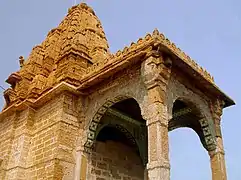Shri Varun Dev Mandir
Shri Varun Dev Mandir (Sindhi: شْرِيْ وَرُڻَ ديوَ مَنْدِرَ ,श्री वरुण देव मंदिर, Urdu: شْرِیْ وَرُنَ دیوَ مَنْدِرَ) is a Hindu temple located in Manora Island in Karachi, Sindh, Pakistan. The temple is devoted to Varuna, the deity that represents water in Hinduism. [1]
| Shri Varun Dev Temple | |
|---|---|
श्री वरुण देव मंदिर | |
 شْرِي وَرُڻَ ديوَ مَنْدِرَ | |
| Religion | |
| Affiliation | Hinduism |
| District | Karachi |
| Deity | Varuna |
| Governing body | Pakistan Hindu Council |
| Location | |
| Location | Manora Beach |
| State | Sindh |
| Country | |
 Shown within Sindh | |
| Geographic coordinates | 24°47′51.3″N 66°58′14.9″E |
| Architecture | |
| Type | Hindu temple |
| Specifications | |
| Temple(s) | 1 |
| Monument(s) | 1 |
| Inscriptions | 2 |
| Website | |
| http://www.pakistanhinducouncil.org/ | |
| Part of a series on |
| Hinduism |
|---|
 |
|
He is the chief governing deity of all the Seas-Oceans and the Sindh river. Sindh river is the only river known to be associated with him; as per the hymns dedicated to him in RigVed. [2]
Due to persecution of Hindus at a large scale in Pakistan, temple's last ritual rites were mainly seen in the year of 1951.
Construction

According to a legend, it was around 16th century when a wealthy sailor by the name of Bhojomal Nancy Bhattia bought Manora Island from the Khan of Kalat, who owned most of the land along the coastline at that time and then his family commissioned a temple on the lay terrain.[3]
The exact year of the temple's construction or foundation is not known[1] but it is widely believed that the current structure was renovated in around 1917–18.[4]
Inscription in devnagri script says,[5] Om, Varun Dev temple.
The inscription in Sindhi on front gate says,[5] dedication from sons in the sacred memory of Seth Harchand Mal Dayal Das of Bhriya. Bhriya is a town in Naushahro Feroze District, Sindh, Pakistan.
Current status
Currently, this temple belongs to the Pakistan Hindu Council. Evacuee Trust Property Board has done to protect or preserve this ancient heritage.
Today, the temple is in a dilapidated state as humid winds are eating into the structure and the rich carvings on the walls of the temple are slowly eroding. There have been efforts to protect and preserve the structure by the Sindh Exploration and Adventure Society (SEAS) under a US government-funded project.[6]
See also
References
- Daily Times article on Varun Dev Temple
- [https://www.hinduwebsite.com/sacredscripts/hinduism/rigveda/varuna_1.asp Rig vedic hymns dedicated to Varun Dev ]
- The Express Tribune - Shri Varun Dev Mandir By Maha Malik, Published: March 1, 2012
- Bukhaari on Flickr
- Manora temple
- Daily Times - US consul general celebrates successful completion of Varun Dev Temple project
